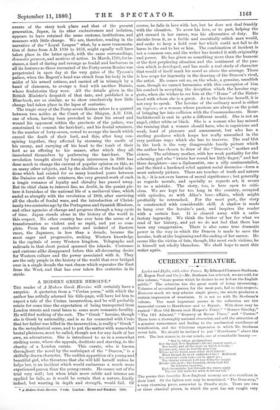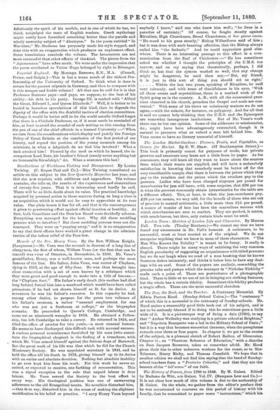CURRENT LITERATURE.
Lyrics and Idylls, with other Poems. By Edmund Clarence Stedman. (C. Kogan Paul and Co.)—Mr. Stedman has selected, we aro told, for this volume, "those poems which ho desires to set before the English public." The selection has the great merit of being interesting. Volumes of occasional poems, for the most part, fail in this respect. However much we may admire single pieces, the whole produces a certain impression of weariness. It is not so with Mr. Stedman's volume. The most important poems in the collection are the memorial verses to Hawthorne and to Bryant. With these may be ranked " How Old Brown took Harper's Ferry," " Horace Greeley," " The Old Admiral," " Kearney at Seven Pines," and " Custer." These have a thoroughly national character, and add the attraction of a genuine earnestness and feeling to the mechanical excellence of versification, and the felicitous expression in which Mr. Stedman never fails. We should be inclined to put " Hawthorne " above the rest. The last stanza is, to our minds, one of remarkable beauty :— " But be whose quickened eye
Saw through New England's life her inmost spirit,— Her heart, and all the stays on which it leant,— Returns not, since he laid the pencil by Whose mystic touch none other shall inherit! What though its work unfinished lies Half-bent The rainbow's arch fades out in ripper air ; The shining cataract half-way down the height Breaks into mist ; the haunting strain that fell
On listeners unaware,
Ends incomplete, but through the starry night The ear still waits for what it did not tell."
The poems that describe New-England scenery are also excellent in their kind. Of the lighter sort may be mentioned, " The Door-step," a very charming piece, somewhat in Praed's style. There are two or three classical pieces, in which the poet has not caught very
felicitously the spirit of his models, and in one of which he has, we think, misjudged the taste of English readers. Greek mythology might surely have furnished something better than the puerile and wholly unworthy subject of " Alectryon." In the poem entitled " In War-time," Mr. Stedman has purposely made his style rugged, and done this with an exaggeration which produces an unpleasant effect. Some translations conclude the volume. The hexameters are not more successful than other efforts of the.kind. The pieces from the " Agamemnon" have mbre merit. We were under the impression that the poem attributed to Victor Hugo belonged by right to Beranger.



































 Previous page
Previous page